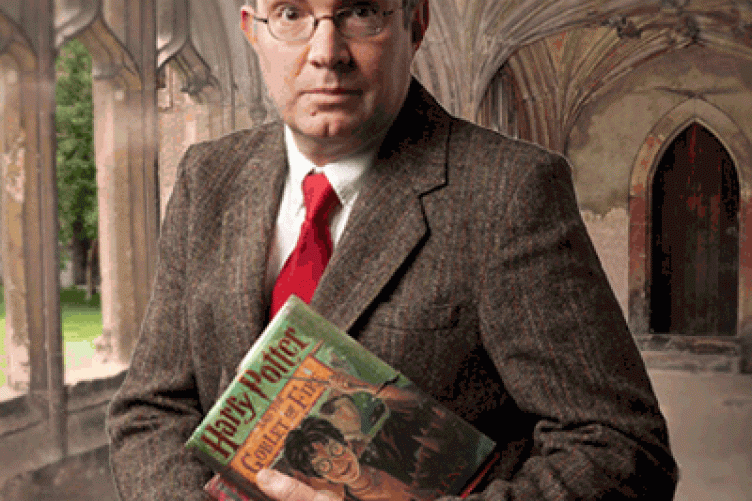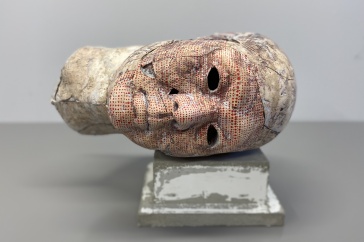
Imagine Harry Potter literature at the center of a spider’s web, with silks expanding out that connect mythology, language, pop culture, psychology, neuroscience, and philosophy back to the literature and to each other—a web of interconnected information. It’s a way of thinking about knowledge that is endemic to that other web—the Internet—and an approach to teaching that English professor James Krasner will be employing in his new summer online course for kids, “Harry Potter as Storytelling.” Krasner has been using this non-linear, non-traditional style of teaching with college students, the current crop of which are among the first generation born and bred in the online world. Learning through inter-connected information is part of their milieu.
It is not an arbitrary choice that Krasner is developing a web-based course and using web-inspired pedagogy to teach Harry Potter literature. The success of the Harry Potter enterprise has everything to do with the web, contends Krasner. The books are great literature, he enthusiastically asserts, but the most important factor in their explosive popularity is the way the Internet has facilitated an avid fan following.
“Fantasy writing works through the pleasure of engaging in encyclopedic information,” says Krasner.
In other words, fantasy novels introduce words, creatures, cultures, and whole worlds that are purely imaginative that the reader must learn like a new language. Fans of fantasy relish the task and take joy in sharing that new language with others.
“Before the Internet, fantasy fans would go to Star Trek conventions and exchange trivia, but the Internet allows you to exchange information at a level never before seen, which makes fan culture much more pervasive,” says Krasner. “And Rowling is a wonderful fantasy writer because she fills her books with imaginative trivia. In Honeydukes, there are 500 types of candy. There are multiple spells, paintings on the walls, characters, little creatures like Hinkypunks. The fans like to exchange information about those, and you can do that on the Internet. So Trekkie behavior has become normal.”
For the children in his Potter course (aimed at grades 4-8), Krasner will connect the wealth of information in the Potter books to the wealth of cultural knowledge from which they derive, in a multimedia, online environment. Fan culture amped up.
Dementor“In one unit of my course, Locations, we will look at Azkaban, the prison in the Potter books,” says Krasner, explaining how the interconnected learning will work. “I’ll talk about the Dementors [the prison guards] and connect them to artistic renderings of the Grim Reaper. We’ll discuss reaping in agriculture and the tradition of showing death as a reaper. Where did that tradition begin? The Black Death in Europe, which was caused by rats, so now we are moving into science. The words Rowling uses to describe Dementors suggest disease and plague. In real life, the bubonic plague produces buboes, swollen lymph nodes. Rowling creates bubotubers, a magical plant, that connects linguistically back to the plague. Switching gears, we’ll discuss how Dementors cause depression. To counteract that depression, Rowling has her characters eat chocolate? Why? Chocolate releases neurochemicals in the brain. So now we've gone all over the place: bubonic plague, neuroscience, history, rats. And that’s what clicking around on the web is like. That's what knowledge is like.”
The idea of learning through web-like exploration has proven quite successful in Krasner’s university courses. Since employing the strategy, he’s found students more engaged in the classroom, and they report better learning experiences on course evaluations. Krasner notes that college students in the current generation are different from previous generations. They read less. So part of his strategy is to more effectively teach a population that won’t as often engage with literature purely for pleasure or artistic merit.
“My expectation is that not all students are going to read all of the assigned books. I think that was always true, but it's more true now. So what I try to do is make links between the books and contemporary culture and ideas—not unlike what I'm describing in the Harry Potter course—in ways that will allow them to fit it into this web-like way of understanding that they have, but in ways that are intellectually authentic,” says Krasner.
The real challenge is to avoid random connections—the type that web surfing can produce—and instead find legitimate historical and intellectual connections, says Krasner. In fact, part of what he wants to teach his students is how they can find those legitimate connections for themselves, amidst a sea of randomness.
Krasner’s interest in web culture and learning has led him to videogame culture and theory. With the increasing sophistication of gaming products, some critics have labeled the new generation of games literary and artistic, raising questions about what constitutes literature, storytelling, and art.
A new videogame called Bioshock Infinite was recently touted by the New York Times as “a literary endeavor for a multimedia age.” According to the glowing review, the game is aesthetically beautiful with a compelling narrative, and addresses morality, politics, culture, history, and more. But with the fast pace of videogames, some educators are concerned that the inability to be thoughtful or reflective during a gaming experience is antithetical to learning. And how do we determine if a game makes the grade as art or literature?
“There are a lot of young people who have grown up on videogames who will argue vigorously that because you're immersed in it, this kind of art form is both unique and more effective,” says Krasner. “I'm always interested in popular art forms. Victorian literature is high art but also popular art, and that is rarely true. Videogames are certainly popular art and are now, in some cases, seen as high art.”
Which brings us back to Harry Potter. Krasner’s fascination with the Potter books stems in part from the fact that they, like the Victorian literary tradition from which they descend, are both high and popular art. Krasner enjoys the masterful way that Rowling is able to generate mass excitement and also do what art is supposed to do—examine the human condition.
While Krasner’s goals for the Potter course are to improve students’ language arts skills and plumb some of the high-art features, he clearly hopes to capitalize on the fun—to revel in the verbal playfulness, charming characters, and ingenious plot twists of Rowling, unparalleled, claims Krasner—with only Dickens in the same league—in creating a complex web of character and plot in such an exciting and emotionally satisfying way.
“Harry Potter as Storytelling: An Online Adventure for the Young Fan” is designed for youth entering grades 4 to 8. The two-week session will run from July 15 to July 26, 2013, and will cost $200. The course is the university’s first Massive Online Course for Kids (MOCK) and the first summer online youth enrichment offering. Registration is open now.




















































